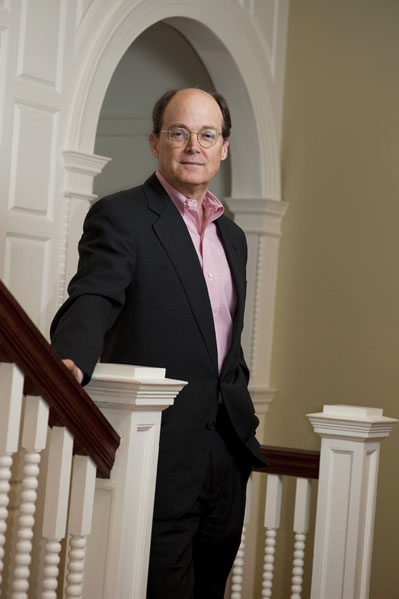May 10, 2010 — Almost 20 years ago, University of Virginia sociologist James Davison Hunter, wrote "Culture Wars: The Struggle to Define America," which argued that some Christians were striving to shape American culture.
Hunter continues that theme in his new book, arguing that those efforts have been fundamentally misguided, based on a misunderstanding of how culture actually changes, and have helped politicize many aspects of public and private life – from education, the media and the arts to family values, sexuality and parenting.
By embracing such politicization, Christians "undermine the message of the very gospel they cherish and desire to advance," Hunter explains in "To Change The World: The Irony, Tragedy and Possibility of Christianity in the Late Modern World," published April 15 by Oxford University Press.
Hunter, LaBrosse-Levinson Distinguished Professor of Religion, Culture and Social Theory and director of U.Va.'s Institute for Advanced Studies in Culture, critiques the political and cultural engagement strategies of the Christian Right and the Christian Left, taking on many respected leaders, from Charles Colson to Jim Wallis and Stanley Hauerwas.
By misreading the nature of the times and focusing so much energy and resources on politics, many Christian leaders have fixed attention on secondary and tertiary problems and false solutions, Hunter writes. While contemporary American Christians have faith and, by and large, hold fast to the central truths of the Christian tradition, they have also been formed by what he calls a larger "post-Christian culture" that less and less resembles anything like the vision of human fulfillment provided by the life of Christ and witness of Scripture.
Tragically, in the name of resisting the internal deterioration of faith and the corruption of the world around them, many Christians, and Christian conservatives most significantly, unwittingly embrace some of the most corrosive aspects of the cultural disintegration they decry, Hunter argues. By nurturing resentments, sustaining them through a discourse of negation toward outsiders and pursuing the power to control and enforce conformity, Christians become functional nihilists, participating in the very cultural breakdown they so ardently strive to resist, he says.
Christians must recognize that, although America clearly benefitted in many fundamental and extraordinary ways from people of faith and the ideals of the Christian tradition, "America was never, in any theologically serious way, a Christian nation," nor will it become so in the future, Hunter writes.
Today's Christians must coherently address modernity's abiding pluralism, learning how to be Christians in a shared world without striving to dominate and control others.
Christians should channel their deep desires "to change the world" through "faithful presence," a theology and practice fundamentally committed to human flourishing – not just for Christian believers, but for everyone, Hunter suggests.
For models of "faithful presence," Hunter points to Christ's teachings and examples in forgiving the sinner, feeding the hungry, healing the sick, raising the dead, loving the outsider and caring for all in need.
Hunter also turns to the prophet Jeremiah's teachings to the Israelites exiled to Babylon after King Nebuchadnezzar's conquest of Jerusalem in 588 B.C. As then, Christians today are, spiritually speaking, exiles in a land of exile, Hunter argues. To come to terms with this exile, Christians should, as Jeremiah exhorted, maintain their distinctiveness as a community, but in ways that serve the common good.
Hunter offers real-life examples. A group of business leaders in Houston founded a private, faith-based school in the most poverty- and crime-ridden part of the city. The school exclusively serves children from low-income families with a program designed to provide educational, spiritual, social and practical resources. The school reaches out to address the needs of the children's families as well by providing counseling, life-skills training, an anti-addiction program and the like. In its own words, the school "exists to promote human flourishing among Houston's poorest families."
Hunter's "masterful book" is structured as three essays that are "persuasive and compelling," notes reviewer Andy Crouch in the current issue of Books & Culture. "It is groundbreaking, it is comprehensive, and it is visionary. Above all, it is wise, both sociologically and theologically. No Christian entrusted with institutional leadership or cultural power should miss the chance to read it."
Through "faithful presence" over coming decades, Hunter argues, Christians can engage social issues and promote important values like family, justice and equity in ways that will speak to the common good, making their politics far more substantive and far less polarized.
Media Contact
Article Information
May 10, 2010
/content/hunter-end-culture-wars-take-faithful-presence

